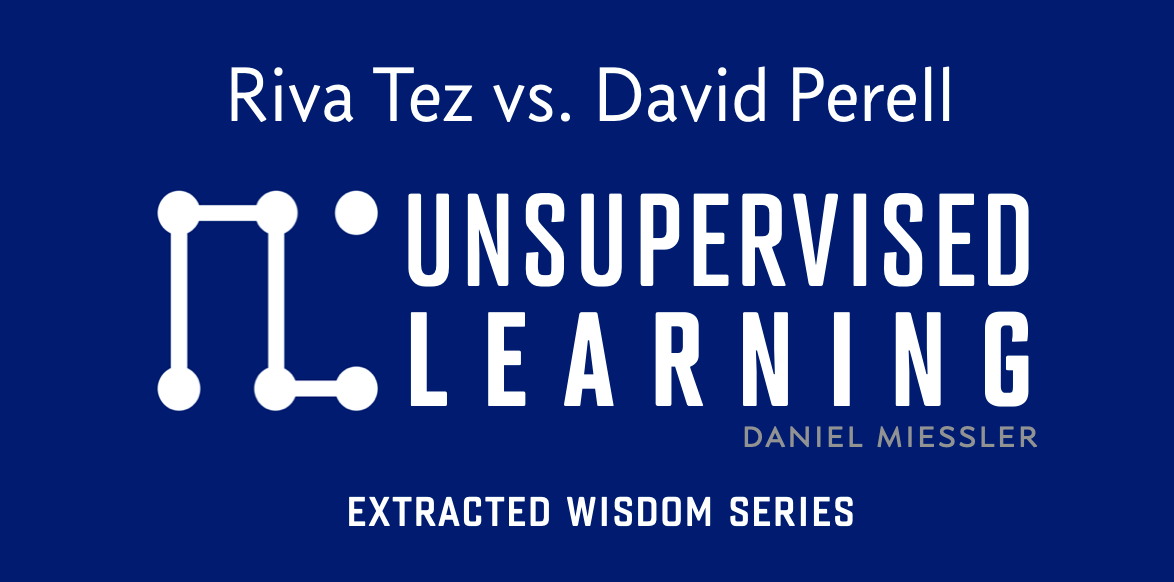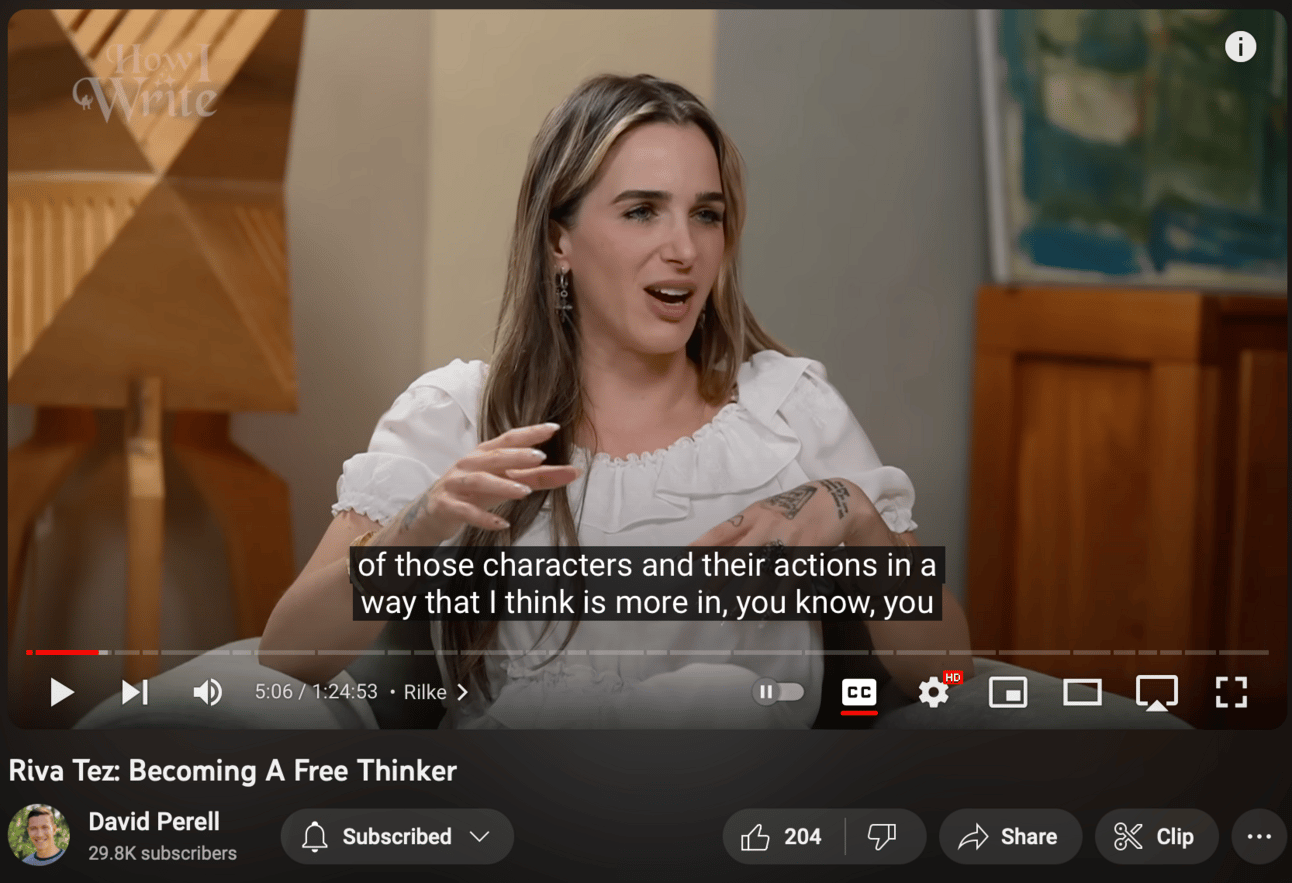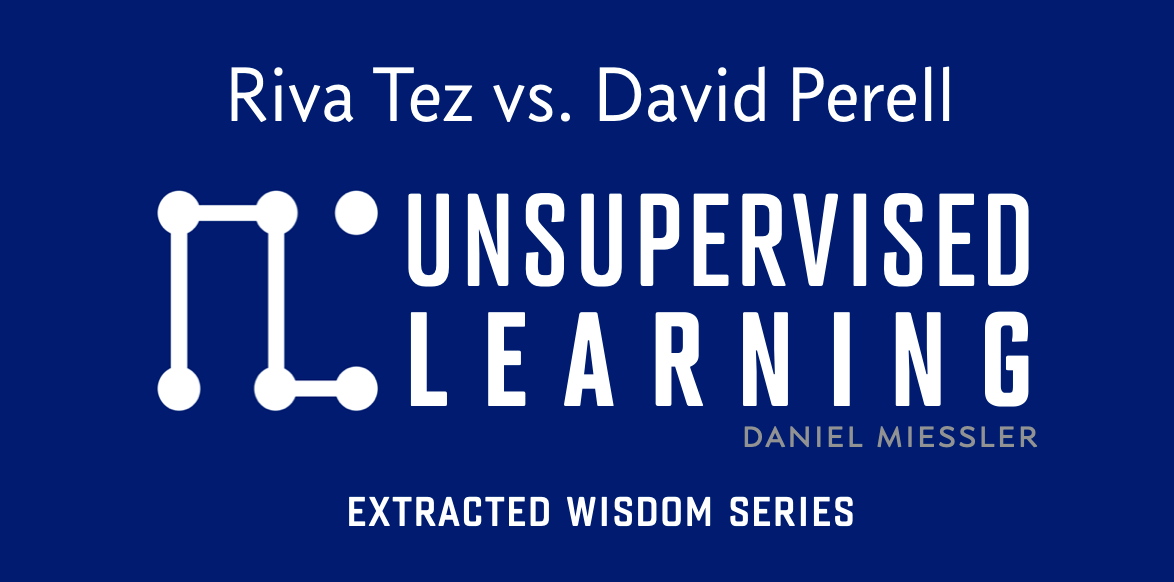Extracted Wisdom: Riva Tez vs. David Perell

ExWis is a project that Extracts Wisdom from textual content, whether that’s a podcast conversation, an interview, a presentation, an essay, an article—basically whatever.
The project takes the input and turns it into a list of things I would have captured if I had 2-3 hours to watch it slowly and take meticulous notes.
—

SUMMARY:
The conversation involves David Perell and Riva Tez discussing various topics related to technology, AI, free-thinking, reading historical texts, and authenticity in writing. They delve into the importance of questioning conventional wisdom, exploring new ideas, and finding meaning in a world full of technology.
IDEAS:
1. Free thinking is a valuable tool in navigating a world filled with technology and AI.
2. Reading historical texts can provide valuable insights into current societal and technological trends.
3. Authenticity in writing resonates more deeply with readers than manufactured narratives.
4. The current societal obsession with optimization can stifle creativity and free thinking.
5. The ability to ask unconventional questions is a crucial skill in exploring new ideas.
6. Understanding the past can provide a framework for understanding present phenomena.
7. The value of deep reading extends beyond mere acquisition of knowledge to a deeper understanding of concepts.
8. The concept of consciousness is still largely unexplored and misunderstood despite advancements in technology.
9. The current trend towards specialization in education neglects the importance of holistic learning.
10. The importance of humility in acknowledging that we do not have all the answers, especially in complex fields like AI and consciousness.
11. The role of technology in shaping human culture and societal norms.
12. The influence of historical texts on contemporary thought processes and societal structures.
13. The potential of technology, especially AI, to redefine what it means to be human.
14. The importance of introspection and per

sonal reflection in understanding oneself and the world.
15. The influence of societal structures and norms on individual thought processes and creativity.
16. The potential dangers of an over-reliance on technology and AI in shaping our understanding of reality.
17. The importance of questioning and challenging societal norms and conventional wisdom.
18. The role of philosophy in shaping our understanding of life and existence.
19. The potential for technology to either enhance or diminish human fulfillment and thriving.
20. The value of diverse experiences and perspectives in enriching our understanding of the world.
QUOTES:
1. "Part of her brilliance is the way she combines her love for Rilke’s poetry with an interest in philosophy, theology, and consciousness."
2. "In a world of people who are obsessed with optimization, Riva is passionately unoptimized."
3. "I'll start watching Netflix when I've read the whole of human history."
4. "If you're an ecstatic person, then yes."
5. "I think we've had this conversation previously, which is that I've probably read Atlas Frye, like every two years, but like 15 years."
6. "I’m David Perell and I’m a writer, teacher, and podcaster."
7. "I'm like, cool. I'll start watching Netflix when I've read the whole of human history."
8. "If you lived forever, you wouldn't have one job, right?"
9. "It's like, there's no such thing. We don't want to have superiority."
10. "It's like, all observable reality is 5 percent of what we can see."
OPINIONS:
1. Riva Tez believes that free thinking is a crucial skill in a world dominated by technology and AI.
2. David Perell agrees with Riva's view on the importance of reading historical texts to gain a deeper understanding of current societal and technological trends.
3. Riva opines that authenticity in writing is more impactful than manufactured narratives.
4. Both Riva and David believe that the societal obsession with optimization can stifle creativity and free thinking.
5. Riva holds the opinion that the ability to ask unconventional questions is a crucial skill in exploring new ideas.
INFLUENCES:
1. Rilke’s poetry has had a profound influence on Riva Tez, inspiring her to question dogma and explore under-explored ideas.
2. The teachings of philosophers like Descartes and Nietzsche have shaped Riva's approach to questioning societal norms and exploring new ideas.
3. The writings of Ayn Rand have influenced Riva's views on individualism and the importance of questioning consensus.
4. The works of Euripides, Homer, and other classical Greek writers have influenced Riva's appreciation for historical texts and their relevance to contemporary issues.
5. The writings of C.P. Snow, William of Ockham, and other thinkers have shaped David's understanding of the divide between humanities and STEM fields.
HABITS:
1. Riva Tez habitually immerses herself in deep reading, often revisiting reading that have moved her in the past to uncover new insights.
2. David Perell practices deep reading daily, focusing on understanding the Bible at a deeper level.
3. Riva has a habit of spending hours each day just thinking, creating a mental space for ideas to come to her.
4. David practices journaling daily, using it as a tool to reflect on his readings and understand how they apply to his life.
5. Riva makes it a point to spend time alone and in nature, which she finds helps her get into a different state where new thoughts and ideas can emerge.
FACTS:
1. The oldest complete New Testament manuscript, Codex Sinaiticus, is believed to have been written in the fourth century.
2. The Ottoman Empire was a historical empire that spanned three continents, lasting from the 14th to the early 20th century.
3. The Federalist Papers were a series of essays written by Alexander Hamilton, James Madison, and John Jay promoting the ratification of the U.S. Constitution.
4. The Byzantine Empire, also known as the Eastern Roman Empire, was a continuation of the Roman Empire in its eastern provinces during Late Antiquity and the Middle Ages.
5. The term "Occam's Razor" is derived from the philosophical principle proposed by William of Ockham, which states that simpler explanations should be preferred over more complex ones.
RESOURCES:
1. Book: "Atlas Shrugged" by Ayn Rand - A novel that explores themes of individualism and questioning consensus.
2. Book: "Alan" by Alan Harrington - A book that explores the concept of immortality and how it could impact society.
3. Book: "The Immortalists" by Alan Harrington - A book that discusses the possibility of achieving physical immortality through scientific means.
4. Book: "The Federalist Papers" - A collection of essays written by Alexander Hamilton, James Madison, and John Jay promoting the ratification of the U.S. Constitution.
5. Podcast: "Fallof Civilizations" - A podcast that explores the collapse of different civilizations throughout history.
NUGGETS:
1. Free thinking is a valuable tool in navigating a world filled with technology and AI.
2. Reading historical texts can provide valuable insights into current societal and technological trends.
3. Authenticity in writing resonates more deeply with readers than manufactured narratives.
4. The current societal obsession with optimization can stifle creativity and free thinking.
5. The ability to ask unconventional questions is a crucial skill in exploring new ideas.
RECOMMENDATIONS:
1. Cultivate the habit of free thinking and questioning conventional wisdom.
2. Read historical texts to gain a deeper understanding of current societal and technological trends.
3. Aim for authenticity in writing to create a deeper connection with readers.
4. Resist the societal obsession with optimization to foster creativity and free thinking.
5. Develop the skill of asking unconventional questions to explore new ideas.
SCORE:
CSR (Consume Slowly Rating) — As Soon as Possible (This Week)
- The content is filled with high-quality insights that align well with the interests provided.
- The conversation covers a wide range of topics, providing a comprehensive look at various aspects of technology, AI, free-thinking, reading historical texts, and authenticity in writing.
- The insights are not only insightful but also thought-provoking, stimulating further exploration and discussion on the topics covered.
- The content provides a unique perspective on these topics, offering a fresh take that is not commonly found in other sources.
- Despite the length of the content, it remains engaging throughout, making it worth consuming in its entirety.
NOTES
This is AI-generated, so there is a potential for things to be incorrect. Don’t use this as authoritative. Rather, use it as an onramp to the source material.